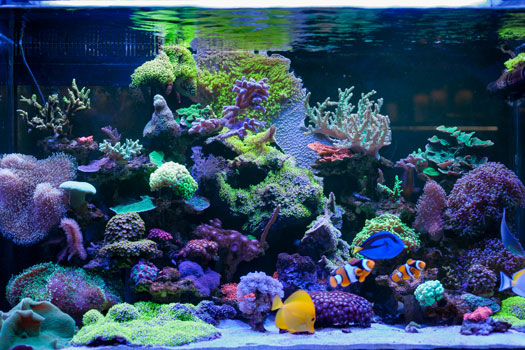- Your shopping cart is empty!
What’s Required to Maintain a Saltwater Aquarium?

The fish keeping hobby can be split into two main categories: freshwater and saltwater habitats. We call the ornamental species that can be kept in both habitats “tropical” even though some of them are actually native to colder waters, but they’re resilient enough to thrive in temperate waters. Saltwater tanks are divided into reef tanks (corals and small, reef-safe fish) and saltwater fish (without corals), but there are a few other saltwater variations, such as predator and brackish water aquariums. The filtration needs are often larger for fish tanks because of the amount of waste larger fish develop, whereas reef tanks demand different filtration and a more pristine water quality to support corals.
You may have heard about saltwater tanks being more difficult to maintain when compared to their freshwater counterparts, and this is correct to a certain extent, but this shouldn’t dissuade novice aquarists. Many of the elements are essentially the same, but you can expect to spend a little more when putting together a reef tank. Let’s look at what you’ll need to get started.
A 55-Gallon Tank
Freshwater aquarium beginners will do fine with a 20-gallon tank. In the case of a reef tank, you should start with nothing smaller than a 30-gallon glass aquarium. This is, of course, unless you want to jump into the world of nano reef tanks, which require quite a bit of involvement to keep tiny species healthy and happy. Bigger will always be better when it comes to saltwater tank selection because it’s easier to keep the reef tank more stable with volume. Saltwater fish tanks should be no smaller than 50 gallons so they will support many species and have the ability to grow and flourish, which cannot be accomplished in an aquarium that’s too small.
Saltwater
Tap water cannot be used for reef tanks. You can either get reverse osmosis or deionized water and mix your own saltwater, which is simple to accomplish and you have 100 percent control over the salinity and quality. Though we don’t recommend it, you can buy prepared saltwater from your aquarium supplier or make your own at home, but you’ll need to get reverse osmosis H2O that has gone through the deionization process. When you get aquarium salt from a shop, you’re (possibly, as long as someone was paying attention to detail) getting a product that contains the additional minerals you need to keep the water healthy.
Water Testing Kits
As you’re establishing the tank prior to introducing plans, live rock, fish, and other species, it’s a good idea to take water samples to the shop for testing. Once the tank has been cycled, the water testing kits you’ll use are designed to measure certain parameters such as salinity, alkalinity, calcium, magnesium, and phosphate.
Filtration Systems
Unlike freshwater tanks that can be managed with a single system, reef tanks require chemical, biological, and mechanical filtration. All-in-one systems are available, but you’ll want to either have a backup for emergencies or else split the processes into activated carbon, bacteria filter media, and a sponge filter.
Live Rock
This is perhaps the reef tank element that completely sets it apart from a freshwater aquarium. As its name indicates, live rock is a marine species based on calcium carbonate deposits that have captured fossilized coral reef dwellers over thousands of years. The bulk of biological filtration in reef tanks is handled by live rock and its microscopic inhabitants. You should only get aquaculture live rock for your reef tank. Even if you’re offered a piece of extracted coral that was used in another tank, you don’t want to perpetuate the practice of taking pieces from coastal reef formations. At Aquatic Warehouse, we only sell sustainable manmade live rock and rock sourced from dry bed formations. This way, we’re not depleting the natural reefs, and you still have a beautiful rock that’s your biological filtration and part of your decoration as well.
Whatever you need to properly care for your saltwater aquarium can be purchased at Aquatic Warehouse. We are also a leading provider of freshwater aquarium supplies and pond equipment. We’re located in Kearny Mesa, or you can order the supplies you need on our website. If you have any questions, don’t hesitate to call one of our friendly representatives at 858-467-9297.
